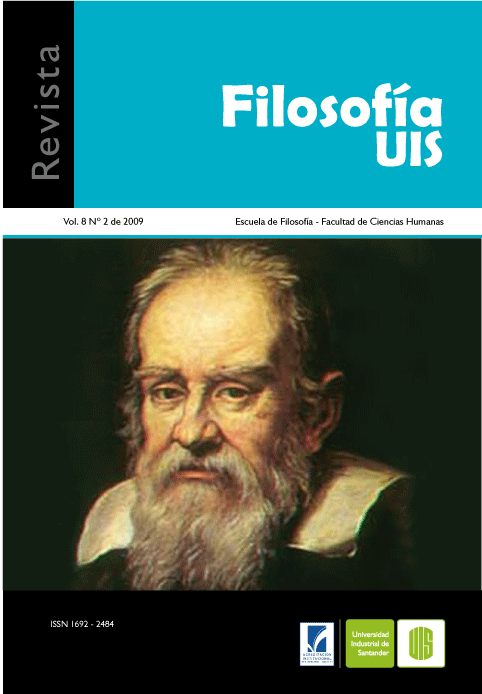About the possibility of thinking the adolescent like an incipient philosopher, can we talk about protophilosophy in the adolescent?
Published 2009-12-16
Keywords
- adolescent,
- protophilosopher,
- protophilosophy,
- to listen
How to Cite
Copyright (c) 2009 Gastón Beraldi

This work is licensed under a Creative Commons Attribution 4.0 International License.
Abstract
The objective of this work does not consist of making a study about the adolescence, in this way it is not a critical study, but rather, to see if it is possible to think, and why not, to imagine that the germ of the philosophy is in that stage of the life, and what must or can we make (it fits if us as a task) from the education of the philosophy to contribute to it.
This work will be oriented to try to give an answer to these questions: a) is the genius that attributes Jaspers to the children, lost in the adolescence or is it increased? b) is the return again and again on the problems, as a failed act a protophilosophy? c) by this way, is it not possible that the adolescent, like the philosopher, by looking for, he/she caresses the knowledge? d) what is which does the adolescent similar to the philosopher figure and make a possible analogy between them? e) and finally which will be the task of the philosophy education if we make this consideration?
Downloads
References
- Bernad de Cháneton, July (1965), La filosofía en la escuela secundaria, Buenos Aires, Eudeba.
- Barnes, Jonathan (1992), Los presocráticos, Madrid, Cátedra.
- Bourdieu, Pierre (s/f), Sociología y cultura, México D.F., C.N.C. y A.
- Cauló, Ana C. (1996), Adolescentes y filosofía. En línea. Internet. Accesible en http:// cablemodem.fibertel.com.ar/sdisegni/adol-y-filo.htm, (Consulta 05/07/2008), Buenos Aires, Instituto de Filosofía.
- Cohn-Bendit, Daniel, Sartre, Jean P., Marcuse, Herbert (1982) La imaginación al poder, Barcelona, Argonauta.
- Comesaña, Juan Manuel (1998), Lógica informal, falacias y argumentos filosóficos, Buenos Aires, Eudeba. Cotofleac, Vasilica, “Eídos popular y abstracción académica” en Revista A Parte Rei, Nº 48, noviembre 2006, 15 pág. En línea. http://serbal.pntic.mec.es/~cmunoz11/vasilica48. pdf. (Consulta 05/07/2008).
- Diccionario Latín-Español (1960), Barcelona, Sopena.
- Dussel, Enrique (1972), Para una de-strucción de la Historia de la Ética I, MéxicoBuenos Aires, Ed. Ser y Tiempo.
- Epicuro (2001) “Carta a Meneceo” en Sobre la felicidad, Madrid, Debate, pp.57-66.
- Ferrater Mora, José (1964), Diccionario de filosofía, Buenos Aires, Sudamercana, 5ª.
- Funke, Gerhard (1968), “La cuestión del objeto propio de la filosofía” en Revista de Filosofía, Nº 20, La Plata, Instituto de Filosofía, Facultad de Humanidades y Ciencias de la Educación, Universidad Nacional de La Plata, pp.7-26.
- García, Víctor O. (2000), “El Espejo Transparente” en Revista digital de educación y nuevas tecnologías, Nº3, enero 2000, s.p. En línea: http://contexto-educativo.com.ar/2000/1/nota-3.htm (Consulta 22/06/2008).
- Heidegger, Martin (2007), El Ser y el Tiempo, Traducción de José Gaos, México D.F-Buenos Aires, F.C.E.
- Heráclito (1983), Parménides-Heráclito. Fragmentos, Traducción de Luis Ferré, Barcelona, Orbis.
- Jaspers, Karl (2003), La filosofía, Traducción de José Gaos, México, D.F., F.C.E.
- Kohan, Walter (1996) “Filosofía de la Educación. Algunas perspectivas actuales” en Aula Nº8, Salamanca, Ed.Universidad de Salamanca, pp.141-151.
- Laplanche, J y Pontalis, J. (1981), Diccionario Psicoanalítico, Barcelona, Editorial Labor.
- Lyotard, Jean F. (1998), ¿Por qué filosofar?, Traduccción de Godofredo González, Barcelona, Altaya.
- Nietzsche, Friedrich (2000), Sobre el porvenir de nuestras instituciones educativas, Traducción de Carlos Manzano, Barcelona, Tusquets.
- Ortega y Gasset, José (2007), ¿Qué es la filosofía?, Madrid, Austral.
- Piaget, Jean (1986), Seis estudios de psicología, Buenos Aires, Sudamericana-Planeta.
- Platón (1985), Banquete, Traducción de Luis Gil y María Araujo, Madrid, Sarpe. Plaza, Pablo, La destrucción y construcción de textos filosóficos: una experiencia de lectura y escritura crítica. En línea. Internet. Agosto 2007. Accesible en: http://www.filo.unt.edu.ar/jorn_unesco/cd/PAN%206.1.PLAZA.pdf (Consulta: 10/04/08).
- Ponce, Anibal (1936), Ambición y angustia de los adolescentes, Buenos Aires, Ed. Rosso.
- Rancière, Jacques (2006), El maestro ignorante, Buenos Aires, Tierra del sur
